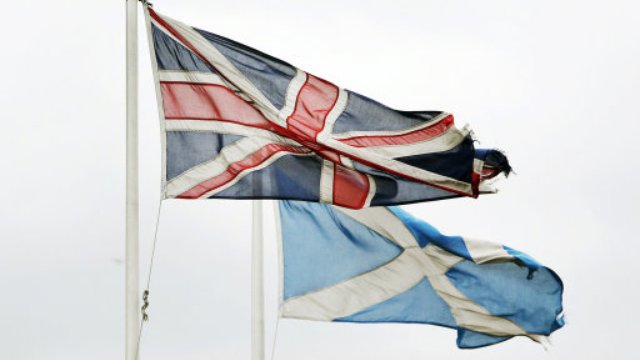Independence Suppport 'Higher Than Ever'
15 March 2017, 06:17 | Updated: 15 March 2017, 06:24

Support for Scottish independence is higher than ever before but the ''potentially divisive'' issue of the European Union may make it difficult for nationalists to win a second referendum, according to a new report.
The latest ScotCen Scottish social attitudes survey suggested there is a ''much higher'' level of support for independence ''than ever existed beforehand'' - with this recorded at 46% in 2016, compared to 39% the previous year and 23% recorded in 2012, the year the previous referendum campaign began.
But the research also suggested Scots are now ''more sceptical about the EU'' than before the 2016 Brexit vote was held.
First Minister Nicola Sturgeon has declared she is to seek to hold a second referendum, accusing Prime Minister Theresa May of ignoring Scotland over Europe after 62% of people north of the border voted to remain last June.
The Scottish Government's ''compromise'' proposals, aimed at keeping Scotland in the single market and securing new powers for Holyrood, were met with a ''brick wall of intransigence'' from Westminster, the First Minister said.
But the ScotCen report stated: ''The EU is potentially a divisive issue for the nationalist movement while the commitment of many voters in Scotland to remain in the EU does not appear to be especially strong.''
Scotland ''emerged from the EU referendum even more sceptical about the EU than it had been at the outset of the referendum campaign'', according to the research, with 67% either wanting the UK to quit Europe and seek to reduce the amount of power Brussels holds.
''A referendum that is called on the basis that independence would enable Scotland to remain part of the EU may not necessarily provide the most propitious circumstances for nationalists to win a second referendum after all,'' it said.
Professor John Curtice, senior research fellow at ScotCen, said: ''The nationalist movement in Scotland has never been stronger electorally.
''Meanwhile, from its perspective, the outcome of the EU referendum appeared to be a perfect illustration of their argument that for so long as it stays in the UK, Scotland is always at risk of having its 'democratic will' overturned by England.
''However, the commitment to the EU of many of those who voted to Remain does not appear to be strong enough that they are likely to be persuaded by the outcome of the EU referendum to change their preference for staying in the UK.
''Meanwhile, there is a risk that linking independence closely to the idea of staying in the EU could alienate some of those who currently back leaving the UK.''
He made his comments after the ScotCen report said: ''All in all, nationalism in Scotland has never seemed to be in finer fettle.
''To that extent, it would seem that the nationalist movement will enter any second referendum in a much stronger position than the one it enjoyed before the September 2014 independence referendum.''
Looking at levels of support for leaving the UK among different age groups, the research - which questioned 1,237 people between July and December 2016 - said the age gap in support for independence ``seems to have widened somewhat''.
In 2012 just under one in five (19%) of those aged 45 and over wanted Scotland to leave the UK, compared to 28% of those under 45.
The 2016 survey found support for independence had increased by 14 points to 33% among those aged 45 and over, and had risen by 19 points in the under-45 age groups, taking it to 47%.
The report went on: ''The gap is currently especially wide between those aged between 16 and 24, 72% of whom support independence, and those aged 65 and over, just 26% of whom do so.''
Scottish External Affairs Secretary Fiona Hyslop said: ''These findings show that support for independence is now at its highest ever level in this series of surveys undertaken since 1999, with independence now the single most popular of all constitutional options.
''Support for independence is now at double the level it was in 2012, while only 8% of people do not want any kind of Scottish Parliament at all.''
Scottish Conservative constitution spokesman Adam Tomkins said the report showed there is ''significant division already across Scotland on a range of constitutional matters''.
He warned: ''Sparking yet another referendum will only make this worse.
''The people of Scotland do not want another referendum and would prefer the SNP got on with dealing with the things that matter.''
Scottish Labour Westminster spokesman Ian Murray said: ''This impartial report underlines that our country is divided enough.
''We must not be divided again by the SNP's obsession for a second independence referendum.
''Nicola Sturgeon doesn't have answers on Europe and this report makes clear that Scotland's attitudes towards this is much more complex than the SNP would admit.''






